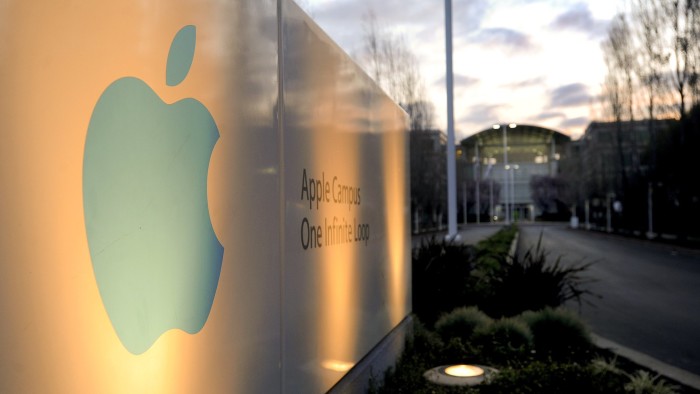Another bite taken out of Apple’s status

Roula Khalaf, Editor of the FT, selects her favourite stories in this weekly newsletter.
Apple is no longer the world’s biggest public company, by one measure at least. Without any fanfare, it was surpassed last month by Alphabet, formerly known as Google. Measured by market capitalisation, Apple remains bigger, at $535bn compared with the search giant’s $485bn. But looking at enterprise value, which includes debt and subtracts cash to give a more complete picture of a company’s worth, Alphabet overtook Apple in December and is now worth $420bn compared with the electronics company’s $393bn.
It is only the latest sign of relative decline. Last year a handful of US tech stocks — branded with the acronym “Fang”— propped up the S&P 500 with their outperformance. Some of them doubled, but the A stood for Amazon, not for Apple, which ended the year down 4 per cent. That understates the fall from grace. From its high in 2015 to now, Apple has shed more than $200bn in equity value.
The reason is not hard to fathom. Investors are haunted by Apple’s overreliance on the iPhone. They fear its gigantic profits are not sustainable. After going deep into China in a successful search for customers, it is hard to see where the new markets are; meanwhile, a lack of compelling new features on the latest models could deter existing users from upgrading.
Apple may make the iPhone phenomenon last longer than expected, but at some point — most analysts believe it will happen this year — the company will report its first ever year-on-year decline in shipments; then the fear will shift to margins. To reinvigorate its stock, what Apple badly needs is a new standout success. It does not look like it is going to be the Apple Watch. It may eventually be a driverless car, but it is impossible for shareholders to estimate cash flows from that invisible project. While California is clogged with Teslas and while Alphabet’s experimental autonomous vehicles are already pootling around public roads, Apple’s own work is confined to secret sheds.
“Looking back at history on when a company starts to face a growth question mark, [it] does not bode well for Apple in the next two years unless it comes up with a major new product category,” wrote analyst Adnaan Ahmad in a note this week. In December, Mr Ahmad left his job at Berenberg, the German bank, after several years of bearish calls on Apple. His unpopular view was to see similarities between the iPhone and Nokia and BlackBerry, whose handsets were once also ubiquitous before a rapid and painful decline. The market mood has now shifted towards Mr Ahmad. His last target price of $85 is closer to the current mark than any of the still-employed 43 Wall Street analysts whose targets can be found on Bloomberg; their average is $143.
Yet for all this gloom, Apple’s leading market cap means that it still accounts for 3.3 per cent of the S&P 500. Most Americans with pension plans are overweight Apple by default. And even that heavy weighting underplays the potential impact of Tuesday’s quarterly earnings, which could bring respite or more pain to the broader stock market. Apple continues to make an outlandish amount of profits, more than 7 per cent of the earnings expected from the entire index this quarter, notes Howard Silverblatt, senior analyst at S&P Dow Jones Indices. That is based on a consensus estimate of $18.2bn in net income.
If it beats that forecast, or if other index constituents miss theirs, Apple’s share of this quarter’s profits might end up even higher. “If I had to bet on it, that number could go up,” says Mr Silverblatt. The only bigger share in the last five years was Apple in the same period last year when it produced $18bn in net income, the highest ever for a public company. You have to go back to the 1980s, says Mr Silverblatt, and the glory days of IBM for any company to have such an outsized share of US corporate profits.
Partly as a result of pressure from Carl Icahn, the activist investor, Apple now distributes a bigger portion of these riches. As David Kostin, Goldman Sachs’ equity strategist, noted this week, the market volatility in the first two weeks of the year has been exacerbated by the absence of corporate buying: companies are banned from opportunistic stock repurchases in the run-up to earnings. Nobody is bigger in the market than Apple, which announced last April it would return $200bn of cash to shareholders over two years, the majority via buybacks. Getting through earnings season should bring a secondary boost.
It may be that Alphabet will seize the crown with more conviction in the coming years, or another company — Microsoft has also closed the gap. But even if it has lost out on one important measure, for now, Apple remains the market’s monster.
Comments